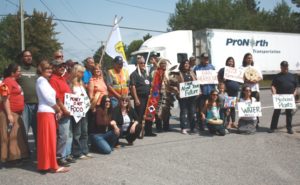TEK elders planning demonstration in Ottawa this October

By Leslie Knibbs
OTTAWA—After over two years of trying ‘to get the ear’ of both provincial and federal governments on TEK’s concerns about aerial spraying, the Elders are “getting tired of fooling around” says Elder Raymond Owl. At a recent TEK meeting on September 16, 2016, it was decided that they will take their fight to Ottawa’s Parliament Hill with a planned protest on aerial spraying on October 12, 2016. All First Nations in the Robinson Huron Treaty are encouraged to attend.
When Elders Willie Pine of Mississauga First Nation and Raymond Owl of Sagamok Anishnawbek First Nation held their first Traditional Ecological Elders meeting on August 19, 2014, in Mississauga First Nation, they had one purpose in mind: to put a halt to aerial spraying of the forests with potentially dangerous chemicals such as Glyphosate. More than two years later, the Elders are still waging their aggressive campaign. The Elders’ commitment to this matter is unwavering and enduring. Owl believes both the provincial and federal governments have breached inherent Indigenous rights to consultation on the issue of aerial spraying.
TEK Elders are not alone in this belief. In a letter from Chief Bob Gloade of Millbrook First Nation in Nova Scotia dated September 1, 2016, to Minister Miller of the Provincial Department of Environment, Gloade, upset with and surprised by government approval to allow Northern Pulp and five other companies to spray 2,600 hectares of forest with Glyphosate, stated, “we take the position that this [spraying] is a matter for consultation with the Millbrook First Nation.” He went on to say that, “the fact that this kind of spraying has been carried out in parts of the province in the past nine years—spraying of which we had no prior knowledge—cannot be construed as our acquiescence, or acceptance of it.”
As is the case in northern Ontario with TEK Elders, Gloade requested a meeting as soon as possible to clarify “on what basis was the decision to not consult with the Mi’kmaw made, and by whom?” Chief Gloade also asked for evidence on how the province determined the product used in spraying is safe and what recent scholarly and scientific works were consulted on the effects of Glyphosate. TEK Elder Raymond Owl, much like Chief Gloade, believes First Nations in Ontario have not been adequately consulted.
Frustrated with lack of response from government, in a letter dated June 4, 2015, TEK Elders requested a meeting with Health Canada where participating Elders could give oral testimony on their knowledge of the environment. Glyphosate is currently under a re-evaluation by Pest Management Regulatory Agency (PMRA) to determine its safety to the environment. The re-evaluation process began in 2015 and a decision will be made in March of 2017. According to PMRA guidelines, all decisions made are based on “scientific data.” The Elders are insisting Traditional Ecological Knowledge and oral testimony should be included in the re-evaluation.
In their fight over the past three years, TEK Elders have submitted a Position Paper to Health Canada asserting Indigenous science is part of oral traditions as set down in Treaty Rights, and is admissible as evidence in deciding the safety of Glyphosate. According to the TEK Group, “the courts have affirmed that oral traditions are part of the Treaty relationship that the Crown is legally obligated to honour and uphold. Furthermore, in Delgamuukw {1997} vs. the Crown, the Supreme Court of Canada found that rules of evidence must be adapted so that oral testimonies can be placed on equal footing with other kinds of evidence.”
Following the request that traditional ecological knowledge be accepted in evidence, a follow-up letter from MP Carol Hughes on behalf of TEK was sent to Minister of Health Jane Philpott on March 24, 2016, expressing the Elders’ concerns, and, requesting a meeting between TEK and the PMRA. In a reply from Minister Philpott received by Hughes Elliott Lake office on July 4, 2016, Philpott stated that the Elders concerns “are being carefully considered by PMRA;” however, after stating this, she said, “the formal consultation period is now closed.” She informed Hughes that Health Canada would “be pleased to arrange a teleconference with TEK representatives to hear their concerns, [and] explain how TEK’s input will be considered in the scientific review process.” The TEK Elders were made aware of the letter to Hughes only after receiving an email from Stéphane Lessard on July 28, 2016, then Director General with Policy, Communications and Regulatory Affairs at the PMRA with Health Canada. The letter from Lessard did not reach TEK until August 31, 2016, when it was picked up by Raymond Owl at Hughes office in Elliott Lake, nearly two months after it arrived. Since the letter from Lessard went out, he has been replaced by Acting Director General Jason Flint.
As for Philpott’s suggestion to arrange “a teleconference with TEK representatives,” TEK is prepared to meet with the PMRA only face-to-face in a sit down according to Elder Raymond Owl. In an effort to have their voices heard and their concerns addressed, TEK is planning a demonstration on Parliament Hill on October 19, 2016, at 12 noon, to protest the spraying of herbicides in traditional territories of the Anishinabek Nation. Clearly a breach of Aboriginal rights included in the Robinson Huron Treaty, in a section stating, “…and further to allow the said Chiefs and their tribes the full and free privilege to hunt over the Territory now ceded by by them, and to fish in the waters thereof, as they have heretofore been in the habit of doing” has been violated. Anishinabek people have not been effectively consulted as necessary within Treaty Rights and Canadian law.

